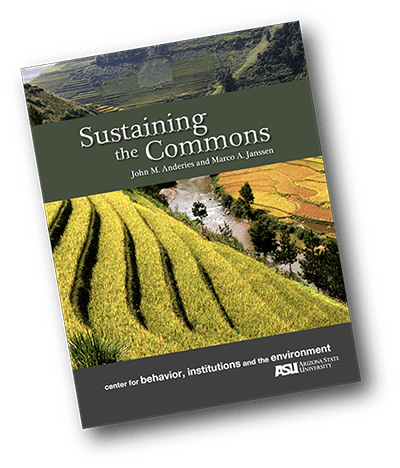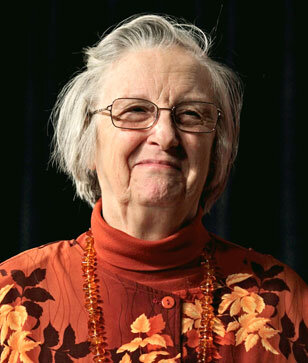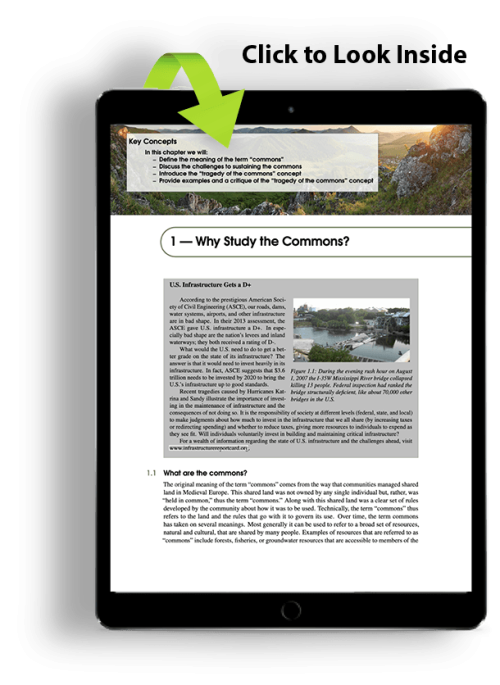
Sustaining the Commons
by John Anderies & Marco Janssen
This textbook discusses the main framework, concepts and applications of the work of Elinor Ostrom and her colleagues for an undergraduate audience.
About the Book
This textbook discusses the main framework, concepts and applications of the work of Elinor Ostrom and her colleagues for an undergraduate audience. We began teaching a course on collective and the commons in 2007 at Arizona State University. Initially we made use of Ostrom’s classic book “Governing the Commons”, but this book was not written for an undergraduate audience. Moreover, many new insights have been developed since the 1990 publication of “Governing the Commons”. Therefore we decided to write our own textbook, which we have been using since the Spring of 2012.
In this book you will learn about institutions–the rules and norms that guide the interactions among us. Those rules and norms can be found from traffic rules, rules in sports, regulations on when and where alcohol can be consumed, to constitutional rules that define who can become president of the United States of America. Rules and norms guide us to cooperative outcomes of so-called collective action problems. If we rely on voluntary contributions only to get anything done, this may not lead to the best results. But research also shows that coercion of people to comply to strict rules do not necessary lead to good outcomes. What combination of sticks and carrots is needed to be successful to solve collective action problems such as sustaining the commons?
The book is based on the work of Elinor Ostrom and her colleagues. Ostrom is best known as the 2009 co-recipient of the Nobel Prize in Economics “for her analysis of economic governance, especially the commons”. Elinor Ostrom was a professor at Indiana University since the mid 1960s, and a part-time research professor at Arizona State University since 2006. She was active in research and teaching until her death at the age of 78 on June 12, 2012.

More information on the work of Elinor Ostrom can be found at:
Topics Covered
Theoretical Background
Define key concepts of the book like institutions, social dilemmas and the commons and provides an introduction to the Institutional Analysis and Development framework
Rules of the Game
Zooming into the specific components of (un)written rules as well as classifying different types of rules.
Case studies
Presents insights from case studies of governing shared resources like fish, trees, water and grass, and introduces the eight Design Principles of Ostrom.
A Systems Perspective
Connecting institutions with resilience research by introducing coupled infrastructure systems and polycentric governance.
Human Behavior
Provides an overview of the findings in diverse social sciences on how humans actually make decisions in social and commons dilemmas.
Theoretical Background
Define key concepts of the book like institutions, social dilemmas and the commons and provides an introduction to the Institutional Analysis and Development framework
Case studies
Presents insights from case studies of governing shared resources like fish, trees, water and grass, and introduces the eight Design Principles of Ostrom.
Human Behavior
Provides an overview of the findings in diverse social sciences on how humans actually make decisions in social and commons dilemmas.
Rules of the Game
Zooming into the specific components of (un)written rules as well as classifying different types of rules.
A Systems Perspective
Connecting institutions with resilience research by introducing coupled infrastructure systems and polycentric governance.
Second Edition 2016
Changes to second edition:
- Material update in line with current events
- Replaced chapters on digital commons, health commons and sport with chapters on resilience, coupled infrastructure systems and polycentric governance.
- This makes the book more focused on sustainability related topics, the main use of the text book in practice.
Free Download
Authors spotlight

John M. Anderies
I am a Professor in the School of Human Evolution and Social Change and the School of Sustainability at Arizona State University.
My research focuses on understanding how the robustness and vulnerability of social-ecological systems are affected by ecological, behavioral, social and institutional factors. My research program combines qualitative insights from present-day, historical, and archaeological case studies of social-ecological systems with formal mathematical modeling and experiments with human subjects.
More information on my ASU Profile.

Marco Janssen
I am a Professor in the School of Sustainability and the Director of the Center for Behavior, Institutions and the Environment at Arizona State University.
I want to understand how people solve collective problems related to sustainability at different scales and levels of organization, especially those problems. Our society is experiencing unprecedented challenges to sustain common resources for future generations at a scale we have never experienced before. How can farmers in developing countries cope with the challenges caused by globalization and climate change? How can we develop urban infrastructure to produce clear fresh water and energy and distribute water, water, energy, people, and information in a sustainable way.
To address these questions I combine behavioral experiments, agent-based modeling, and case study analysis. For more information on my research, visit my website.
Readers say

“Lucid, succinct intro to Ostrom’s work.”
Liz Neely

“A real handbook for commons undergraduates: this is something I have waited for, for years!”
Read the full review
Giangiacomo Bravo

Read the full review
David bollier
“This text is what I have been waiting for in order to teach environmental governance – I look forward to using it in my classroom!”
Read the full review
Kayla Yurco

“Great read!”
Raúl Pacheco-Vega

Contact
For inquiries about this book please contact Marco Janssen at marco.janssen@asu.edu.
